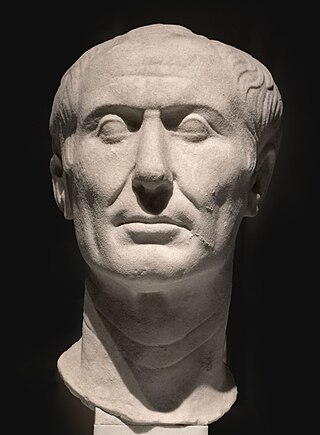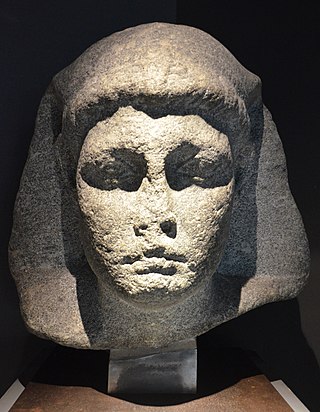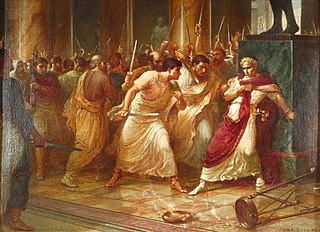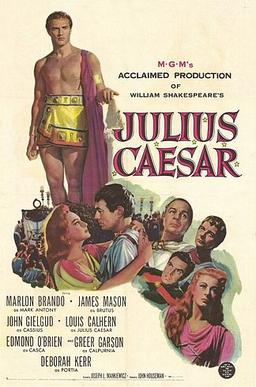Liscus was Vergobretus (chief magistrate) of the Aedui of central Gaul in 58 BC. He revealed to Julius Caesar the role of his compatriot Dumnorix in withholding supplies.
Liscus was Vergobretus (chief magistrate) of the Aedui of central Gaul in 58 BC. He revealed to Julius Caesar the role of his compatriot Dumnorix in withholding supplies.

Gaius Julius Caesar was a Roman general and statesman. A member of the First Triumvirate, Caesar led the Roman armies in the Gallic Wars before defeating his political rival Pompey in a civil war, and subsequently became dictator from 49 BC until his assassination in 44 BC. He played a critical role in the events that led to the demise of the Roman Republic and the rise of the Roman Empire.

Around the start of the Common Era, the family trees of the gens Julia and the gens Claudia became intertwined into the Julio-Claudian family tree as a result of marriages and adoptions.

Vercingetorix was a Gallic king and chieftain of the Arverni tribe who united the Gauls in a failed revolt against Roman forces during the last phase of Julius Caesar's Gallic Wars. After surrendering to Caesar and spending almost six years in prison, he was executed in Rome.

Gaul was a region of Western Europe first clearly described by the Romans, encompassing present-day France, Belgium, the Netherlands, Luxembourg, and parts of Switzerland, Germany, and Northern Italy. It covered an area of 494,000 km2 (191,000 sq mi). According to Julius Caesar, who took control of the region on behalf of the Roman Republic, Gaul was divided into three parts: Gallia Celtica, Belgica, and Aquitania.

The Ides of March is the 74th day in the Roman calendar, corresponding to 15 March. It was marked by several religious observances and was a deadline for settling debts in Rome. In 44 BC, it became notorious as the date of the assassination of Julius Caesar, which made the Ides of March a turning point in Roman history.

The Tragedy of Julius Caesar (First Folio title: The Tragedie of Ivlivs Cæsar), often abbreviated as Julius Caesar, is a history play and tragedy by William Shakespeare first performed in 1599.

Ptolemy XV Caesar, nicknamed Caesarion, was the last pharaoh of Ptolemaic Egypt, reigning with his mother Cleopatra VII from 2 September 44 BC until her death by 12 August 30 BC, then as sole ruler until his death was ordered by Octavian.

The gens Julia was one of the most prominent patrician families in ancient Rome. Members of the gens attained the highest dignities of the state in the earliest times of the Republic. The first of the family to obtain the consulship was Gaius Julius Iulus in 489 BC. The gens is perhaps best known, however, for Gaius Julius Caesar, the dictator and grand uncle of the emperor Augustus, through whom the name was passed to the so-called Julio-Claudian dynasty of the first century AD. The nomen Julius became very common in imperial times, as the descendants of persons enrolled as citizens under the early emperors began to make their mark in history.

The Battle of Alesia or Siege of Alesia was the climactic military engagement of the Gallic Wars, fought around the Gallic oppidum of Alesia in modern France, a major centre of the Mandubii tribe. It was fought by the Roman army of Julius Caesar against a confederation of Gallic tribes united under the leadership of Vercingetorix of the Arverni. It was the last major engagement between Gauls and Romans, and is considered one of Caesar's greatest military achievements and a classic example of siege warfare and investment; the Roman army built dual lines of fortifications – an inner wall to keep the besieged Gauls in, and an outer wall to keep the Gallic relief force out. The Battle of Alesia marked the end of Gallic independence in the modern day territory of France and Belgium.

Caesar is a title of imperial character. It derives from the cognomen of Julius Caesar, a Roman dictator. The change from being a familial name to a title adopted by the Roman emperors can be traced to AD 68, following the fall of the Julio-Claudian dynasty.

Et tu, Brute? is a Latin phrase literally meaning "and you, Brutus?" or "also you, Brutus?", often translated as "You as well, Brutus?", "You too, Brutus?", or "Even you, Brutus?". The quote appears in Act 3 Scene 1 of William Shakespeare's play Julius Caesar, where it is spoken by the Roman dictator Julius Caesar, at the moment of his assassination, to his friend Marcus Junius Brutus, upon recognizing him as one of the assassins. The first known occurrences of the phrase are said to be in two earlier Elizabethan plays; Henry VI, Part 3 by Shakespeare, and an even earlier play, Caesar Interfectus, by Richard Edes. The phrase is often used apart from the plays to signify an unexpected betrayal by a friend.

Julius Caesar is a 1953 American film adaptation of the Shakespearean play, directed by Joseph L. Mankiewicz and produced by John Houseman for Metro-Goldwyn-Mayer. It stars Marlon Brando as Mark Antony, James Mason as Brutus, John Gielgud as Cassius, Louis Calhern as Caesar, Edmond O'Brien as Casca, Greer Garson as Calpurnia, and Deborah Kerr as Portia.

The Julii Caesares were the most illustrious family of the patrician gens Julia. The family first appears in history during the Second Punic War, when Sextus Julius Caesar was praetor in Sicily. His son, Sextus Julius Caesar, obtained the consulship in 157 BC; but the most famous descendant of this stirps is Gaius Julius Caesar, a general who conquered Gaul and became the undisputed master of Rome following the Civil War. Having been granted dictatorial power by the Roman Senate and instituting a number of political and social reforms, he was assassinated in 44 BC. After overcoming several rivals, Caesar's adopted son and heir, Gaius Julius Caesar Octavianus, was proclaimed Augustus by the senate, inaugurating what became the Julio-Claudian line of Roman emperors.

Gaius Julius Caesar(; Latin: [ˈɡaːiʊs ˈjuːliʊs ˈkae̯sar]; c. 140 BC – 85 BC) was a Roman senator, a supporter of his brother-in-law, Gaius Marius, and the father of Roman dictator Julius Caesar.

Gaius Julius Caesar, one of the most influential men in world history, has frequently appeared in literary and artistic works since ancient times.
The phrase "crossing the Rubicon" is an idiom that means "passing a point of no return". Its meaning comes from allusion to the crossing of the river Rubicon by Julius Caesar in early January 49 BC. The exact date is unknown. Scholars usually place it on the night of 10 and 11 January because of the speeds at which messengers could travel at that time.

Julius Caesar was assassinated by a group of senators on the Ides of March of 44 BC during a meeting of the Senate at the Curia of Pompey of the Theatre of Pompey in Rome where the senators stabbed Caesar 23 times. They claimed to be acting over fears that Caesar's unprecedented concentration of power during his dictatorship was undermining the Roman Republic. At least 60 to 70 senators were party to the conspiracy, led by Marcus Junius Brutus, Gaius Cassius Longinus, and Decimus Junius Brutus Albinus. Despite the death of Caesar, the conspirators were unable to restore the institutions of the Republic. The ramifications of the assassination led to his Martyrdom, the Liberators' civil war and ultimately to the Principate period of the Roman Empire.
Caesar's Comet was a seven-day cometary outburst seen in July 44 BC. It was interpreted by Romans as a sign of the deification of recently assassinated dictator, Julius Caesar. It was perhaps the most famous comet of antiquity.

The military campaigns of Julius Caesar constituted both the Gallic Wars and Caesar's civil war. The Gallic War mainly took place in what is now France. In 55 and 54 BC, he invaded Britain, although he made little headway. The Gallic War ended with complete Roman victory at the Battle of Alesia. This was followed by the civil war, during which time Caesar chased his rivals to Greece, decisively defeating them there. He then went to Egypt, where he defeated the Egyptian pharaoh and put Cleopatra on the throne. He then finished off his Roman opponents in Africa and Hispania. Once his campaigns were over, he served as Roman dictator until his assassination on 15 March 44 BC. These wars were critically important in the transition of the Roman Republic into the Roman Empire.

Cajus Julius Caesar is a German politician of the Christian Democratic Union (CDU). He served in the Bundestag, the parliament of Germany, 1998–2005, 2007–2009 and 2011–2017.